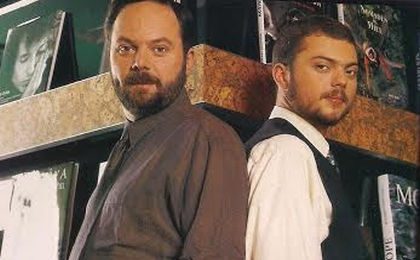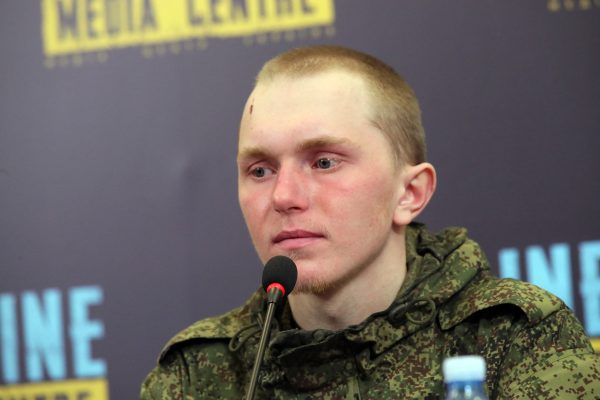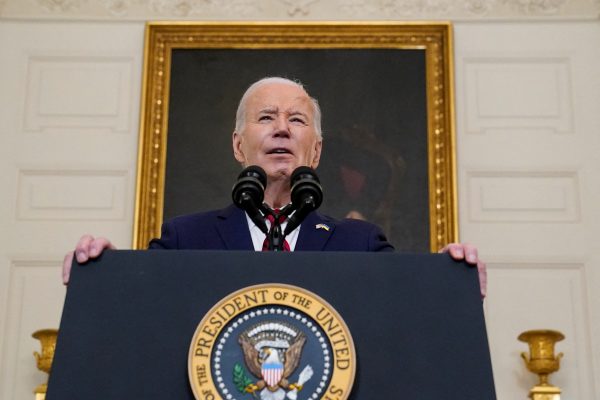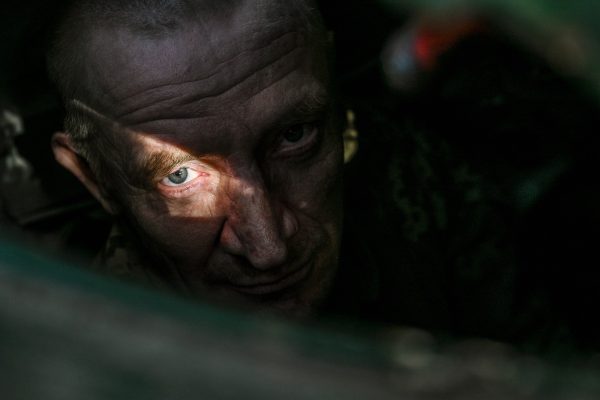An intrepid journalist and outspoken critic of the Kremlin, Vladimir Kara-Murza, is facing the full blast of Putin’s rage – the Kremlin wants to send him to prison for 25 years for his public anti-war stand.
In the West, Kara-Murza became known mostly as an anti-Kremlin lobbyist. In Russia, he was always known as Vladimir Kara-Murza Jr., the son of a famous liberal journalist, and host of the first professional and independent TV channel in Russia.
When Putin first came to power, it was Vladimir Kara-Murza Sr. who gave an example of integrity, both as a journalist and as a prominent member of the Russian intelligentsia. He and his friends fought to the bitter end the Kremlin’s campaign to erase media freedom.
In 2001, NTV was the most popular and most influential television channel in the country and took a very critical stance towards the newly installed president, Vladimir Putin, and particularly his brutal war in Chechnya. The Kremlin attacked the channel, but the journalists fought back. In April of that year, Putin’s patience ran out. What happened next, we described in our book The Compatriots.
Early on the morning of April 14, 2001, the Russian leader unleashed squads of special forces troopers in a classic seize-and-capture operation. It was very quiet that Holy Saturday, the day after Good Friday, as short-haired men in dark suits made their way beneath the entrance’s concrete canopy and in through the glass doors marking the entrance to the rectangular, 13-story Ostankino TV center in northeastern Moscow. This was the nerve center of Russian television and housed nearly all the country’s TV channels.
They split into two groups: the first went to the elevators, and the second took the stairs. They met on the eighth floor, which was marked NTV in huge green letters.
The NTV newsroom’s night shift was taken completely by surprise. The men in dark suits told them, very politely, that they could either comply with their new bosses or vacate the premises.
The move marked the culmination of several weeks of maneuvering as the Kremlin had tried to subdue the disobedient channel. Now Putin’s people made their move and sent their mercenaries to seize the channel and get rid of troublemakers.
One of the first NTV journalists to hear the news was Vladimir Kara-Murza Sr. He was at home on his only day off. Then 42 years old, was an anchorman on NTV’s nightly news program, easily recognizable thanks to his trademark black turtleneck, gray jacket, and ducktail beard.
His unmistakable intonation and intelligence made him one of the most respected voices in Russian television. When he heard what had happened, he immediately got dressed. Throwing on his gray and black outfit and went to work. During the 15-minute drive to Ostankino, he bought the cab driver’s sunglasses and asked to be dropped at the center’s back entrance. Using his still-valid ID, he took an elevator to the 11th floor, walked along a maze of corridors to the other end of the building, and then descended to the eighth floor and NTV’s offices.
There he bumped into his cameraman. They had worked together in many hotspots, including Chechnya. Taking his sunglasses off, Kara-Murza told his cameraman to turn on his Betacam camera. He then approached a new security guard at the entrance to the floor and said in a firm voice, “I’m Vladimir Kara-Murza, NTV TV company, who are you? Your name and surname!” Faced with an instantly recognizable TV celebrity, the astonished guard let them in.
Almost immediately he saw two men approaching. One was the new chief editor, just appointed by the Kremlin. The second was Oleg Dobrodeev, who had been CEO of NTV only a year earlier. When NTV started fighting with Putin, Dobrodeev defected to Russian state television.
Dobrodeev saw Kara-Murza and turned away, but the journalist blocked him with his hand and asked: “A question for our viewers. What is the chairman of state-owned TV, doing at” — he looked at his wristwatch — “5:30 on a Saturday morning on the premises of NTV?”
Despite Kara-Murza’s heroics, it was the end of NTV as a recognizable entity. Many of NTV’s most prominent journalists had left in protest at its effective seizure by the state. It was also the end of a 25-year friendship. Oleg Dobrodeev had been Kara-Murza’s friend since the days they studied history at Moscow University. Dobrodeev knew perfectly well, better than anyone, that integrity was the quality that defined Kara-Murza Sr since his youth.
Kara-Murza Sr was a descendant of a distinguished Moscow family, whose scions — among them, historians, scholars, and lawyers — had long belonged to the intelligentsia. His father, also a journalist, had spent several years in Stalin’s labor camps.
Like father, like son. Kara-Murza refused to work for the Soviet system. Indeed, he was lucky to have graduated at all from Moscow University in the late 1970s — the fourth generation of his family to study there — after a student party got a little out of hand, with the result that a notice board containing an image of Leonid Brezhnev was accidentally set alight and thrown from a 17th-floor window, probably by Kara-Murza. Only the intercession of a sympathetic Soviet official saved him from expulsion. He graduated with distinction and took work tutoring by day, and stoking a boiler by night.
But the times were changing. It was an age of new possibilities. When the Soviet Union collapsed, former classmate Dobrodeev, now working in Russian television, invited Kara-Murza to come work with him. By 2001, Kara-Murza had spent almost a decade at NTV. His career on television made sense to him as part of his family’s mission; this was the kind of role Moscow’s liberal intelligentsia should play in Russian society. He was proud that his 19-year-old son already shared his sense of direction: in 2001, Kara-Murza Jr. was already a part-time journalist.
Now, 20 years after that scene in the corridors of Ostankino, Dobrodeev remains the head of Russian television and Kara-Murza Sr is dead. A man of integrity, he never accepted a job in the pro-Kremlin media. He retained his gentle manners and his smile; and it was always a great joy to bump into him, as we lived in the same area in the center of Moscow on Baumanskaya — he was a fierce patriot for our neighborhood.
Сегодня, 28 июля, ушёл из жизни Владимир Алексеевич Кара-Мурза (1959-2019). Историк, тележурналист, один из основателей «старого НТВ». Мой папа. Ушёл в 8 утра, в день своих именин. О месте и времени прощания семья сообщит дополнительно. pic.twitter.com/F9x0LwhZ92
— Vladimir Kara-Murza (@vkaramurza) July 28, 2019
He passed away in 2019 at just 59, deeply affected by the two poisonings of his only son, Vladimir Kara-Murza Jr, in 2015 and 2017. Because by now Kara-Murza Jr was an opposition politician, with as little respect for the Putin regime as his father. Kara-Murza Jr survived the assassination attempts (almost certainly the work of an FSB poison squad) but his enemies have pursued him by other means — he is now on trial for discrediting the Russian armed forces.
Kara-Murza is maintaining a proud family tradition — raising his voice, much respected among Russian liberals — against oppression and warmongers. It’s always been the role Russian liberal intelligentsia has aspired to play, notwithstanding the costs – and in Russia, the costs are too often a prison cell or death. Sometimes both.
Now 41, he has lost none of his fire in the face of a risible judicial process. Facing a court whose primary task is to fulfill the wishes of the state, Kara-Murza said on April 10: “Not only do I not repent of any of this, I am proud of it.” He added his hope that one day, “the darkness over our country will dissipate” and that “those who kindled and unleashed this war, rather than those who tried to stop it, will be recognized as criminals.” A joint Russian-British national, he is due to be sentenced on April 17.
It is easy to despair about Russia’s future under a man like Putin. But it is worth remembering that the country also contains people like the Kara-Murzas, the latest in a long line of Russian intellectuals who have worked for a better future. And are willing to pay the awful price exacted by Russia’s dictators for dissent.
Andrei Soldatov and Irina Borogan, both non-resident senior fellows at CEPA, are Russian investigative journalists, co-founders, and editors of Agentura.ru, which monitors Russian secret service activities. Both have covered Russian security services and terrorism for more than two decades.
Europe’s Edge is CEPA’s online journal covering critical topics on the foreign policy docket across Europe and North America. All opinions are those of the author and do not necessarily represent the position or views of the institutions they represent or the Center for European Policy Analysis.





